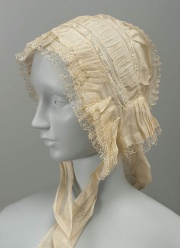Muslin
Jump to navigation
Jump to search
Description
A plain weave, often undyed, 100% Cotton fabric. Muslin was named for the city of Mosul in India. It was introduced to Europe in the 17th century. The fabric can vary in weight from light to medium and in texture from fine to coarse. Muslin is usually bleached, sized, or starched prior to use. It is often used for domestic furnishings, such as curtains or sheets. In India, the soft, sheer, high quality Dacca muslin, was dyed, embroidered and used for clothing.
Synonyms and Related Terms
Dacca muslin; sheeting; Musselin (Deut.); mousseline (Fr.); muselina (Esp.); mousseline (Ned);
Applications
- Storage covers
- Covering internal supports
- Lining mounts
- Rolling textiles
Additional Images
Resources and Citations
- Rachael Perkins Arenstein, Lisa Goldberg, and Eugenie Milroy, ‘Support and Rehousing for Collection Storage’ In ‘Preventive Conservation: Collection Storage’ Lisa Elkin and Christopher A. Norris (eds.), Society for the Preservation of Natural History Collections, New York. 2019.
- M. Doerner, The Materials of the Artist, Harcourt, Brace & Co., 1934
- Rosalie Rosso King, Textile Identification, Conservation, and Preservation, Noyes Publications, Park Ridge, NJ, 1985
- Matt Roberts, Don Etherington, Bookbinding and the Conservation of Books: a Dictionary of Descriptive Terminology, U.S. Government Printing Office, Washington DC, 1982
- Edward Reich, Carlton J. Siegler, Consumer Goods: How to Know and Use Them, American Book Company, New York City, 1937
- Website: www.fabrics.net
- Wikipedia: http://en.wikipedia.org/wiki/Muslin (Accessed Nov. 9, 2005)
- G.S.Brady, Materials Handbook, McGraw-Hill Book Co., New York, 1971 Comment: p. 247
- The American Heritage Dictionary or Encarta, via Microsoft Bookshelf 98, Microsoft Corp., 1998
- Art and Architecture Thesaurus Online, http://www.getty.edu/research/tools/vocabulary/aat/, J. Paul Getty Trust, Los Angeles, 2000
- Random House, Webster's Encyclopedic Unabridged Dictionary of the English Language, Grammercy Book, New York, 1997





